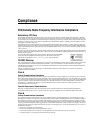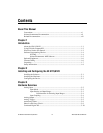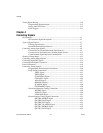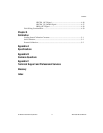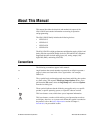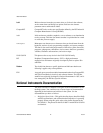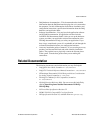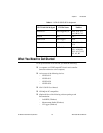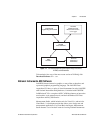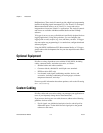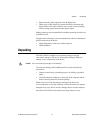
© National Instruments Corporation 1-1 NI 6115/6120 User Manual
1
Introduction
This chapter describes the NI 6115/6120, lists what you need to get started,
describes the optional software and optional equipment, and explains how
to unpack the device.
About the NI 6115/6120
Thank you for buying an NI 6115/6120. The NI 6115/6120 is a Plug and
Play multifunction analog, digital, and timing I/O device for PXI and PCI
bus computers. The NI 6115 features a 12-bit A/D converter (ADC) per
channel with four simultaneously sampling analog inputs, and two 12-bit
D/A converters (DACs) with voltage outputs. The NI 6120 features a 16-bit
ADC per input channel and 16-bit DACs for output. Each device features
eight lines of TTL-compatible correlated DIO, and two 24-bit
counter/timers for TIO.
The NI 6115/6120 is a DAQ device for PXI or the PCI bus. The device
is software configured and calibrated, and completely switchless and
jumperless. This feature is made possible by the NI MITE bus interface
chip that connects the device to the PXI or PCI I/O bus. The MITE
implements the PCI Local Bus Specification so that you can configure
all the interrupts and base memory addresses with software.
The NI 6115/6120 uses the NI data acquisition system timing controller
(DAQ-STC) for time-related functions. The DAQ-STC consists of three
timing groups that control AI, AO, and general-purpose counter/timer
functions. These groups include a total of seven 24-bit and three 16-bit
counters and a maximum timing resolution of 50 ns. The DAQ-STC makes
possible such applications as buffered pulse generation and equivalent time
sampling.
The NI 6115/6120 uses the Real-Time System Integration (RTSI) bus to
easily synchronize several measurement devices to a common trigger or
timing event. The RTSI bus allows synchronization of the measurements.
The RTSI bus consists of the RTSI bus interface and a ribbon cable to route
timing and trigger signals between as many as five DAQ devices in the
computer. If you are using the NI PXI-6115/6120 in a PXI chassis, RTSI
lines, known as the PXI trigger bus, are part of the backplane. Therefore,



